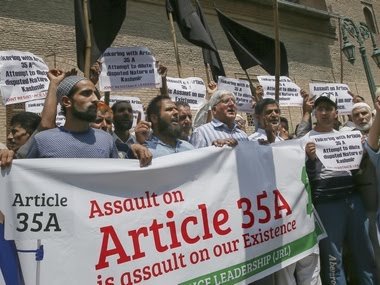Abolishing Article 35A Will Dilute Autonomy Granted Under Article 370 For J&K, Breach UN Resolution
Srinagar: The Supreme Court on Monday began hearing arguments challenging the constitutional validity of Article 35A of the Constitution.
At the outset, it is important to note that the very question of if Article 35A is a part of the Constitution or not is in doubt.
In any event, Article 35A protects the rights of permanent residents of Jammu and Kashmir. Before this complex constitutional question can be addressed, it is important that certain context is supplied.
It is significant to note that British India was not at all times a unitary administration.
There were the parts of India that formed a part of British India proper.
The remaining were the princely states who in most cases were only subject to limited British administration.
The British government only controlled certain external affairs and matters relating to the Constitution.
A classic example is Hyderabad, which not only had its own currency, but also its own railway.
In effect, they were subject to the control of the British by way of what was known as a resident commissioner who would guide the princely states and in effect controlled the whole of its domestic affairs.
Interestingly this is also why India’s head of state during the British era was a “Viceroy” and a “Governor General”.
The role of the Governor General was for British India proper (Madras, Bombay, Central Provinces, Bengal etc.) and the second aspect of the dual role of “Viceroy” was for the princely states.
Upon the coming into force of the [UK] Indian Independence Act, 1947 the princely states found themselves suddenly as independent states.
The Government of India Act, 1935 made provision for these states to join the Indian Union.
Post-independence the act along with some modifications functioned as India’s interim constitution till 26 January 1950.
During this period various agreements were concluded with the states.
The governing document being an Instrument of Accession followed by what was known as standstill agreements that kept the relationship between the now independent India and the princely states the same as they were prior to Independence.
Jammu and Kashmir acceded to the Union in the year 1948 via an Instrument of Accession that made clear that it did not mean that the Maharaja of Jammu and Kashmir would accept any future Constitution of India.
That’s why on enactment of the Constitution, Article 370 providing various transition provisions was brought into force.
This was also complicated by UN Security Council Resolution 47 that kept the state’s accession to India an open question subject to a plebiscite conducted by the UN.
Though the resolution was non-binding, India had to wait for confirmation before the accession could be considered complete.
This was done when the state adopted its Constitution in the year 1957 and declared itself to be a part of India.
Article 370 provides that the Indian Constitution would be extended to Jammu and Kashmir subject to terms as the President of India may determine.
This would mean modifications. Article 35A accordingly came into force with the concurrence of the state government via the Constitution (Application To Jammu And Kashmir) Order, 1954 and it granted Indian citizenship to residents of Jammu and Kashmir but created a concept of “permanent resident”.
This was to protect persons who were subjects of Jammu and Kashmir and as India was now a republic, the status changed from subjects to that of permanent residents.
Essentially Jammu and Kashmir’s relationship post-1954 was the same as China’s current relationship with Hong Kong.
Kashmir is a part of India but enjoys a special status.
Article 35A is not a part of the Indian Constitution proper, but only a part of the Constitution as it is applicable to Jammu and Kashmir.
Which means that Article 35A is not available for anyone else, nor does it extend to anywhere else but the state of Jammu and Kashmir.
To say that Article 35A is a part of the Constitution is a mistake in law, it is neither an amendment nor is it a substantive part of the Constitution.
It is issued pursuant to Article 370 (which is the substantive law) that permits the President to modify the Constitution as it applies to Jammu and Kashmir.
Therefore the question of the constitutional validity of Article 35A won’t turn on the “basic structure” as Article 370 was there in the Constitution at the time of inception.
The presidential order has also been amended from time to time. Provisions of the Indian Constitution extended via the said order will override provisions in the state Constitution in the event of a conflict but in the event the Indian Constitution (as extended) is silent on a point then the state Constitution prevails.
All extensions, however, are done only with the consent of the Jammu and Kashmir government.
Further abolishing Article 35A itself, unilaterally would take away certain constitutional guarantees offered to Jammu and Kashmir residents at the time of Delhi Agreement of 1952. Jammu and Kashmir is a part of India but as Security Council Resolution 47 is still in force, the status of the state is one that is still an open question under international law.
India has control over Jammu and Kashmir but the future of the state depends on the outcome of a plebiscite.
India’s case is that the Constitution of Jammu and Kashmir is proof of the plebiscite a position that Pakistan hotly contests.
But abolishing Article 35A that provides a distinct identity to Kashmiris is one that will result in full integration, which is against the spirit of autonomy granted under Article 370.
Further many other states enjoy similar rights. For example Arunachal Pradesh. If Article 35A goes, the future of Arunachal Pradesh’s policy of protecting its culture and tribes will also become an open one.
Article 35A is not a part of the Constitution nor does it appear in the authoritative text. It is part of an appendix.
Courtesy: FirstPost



